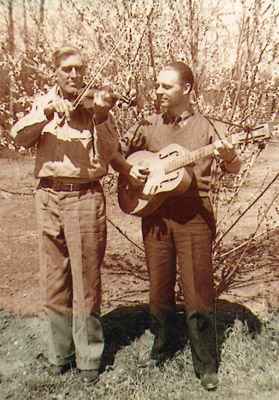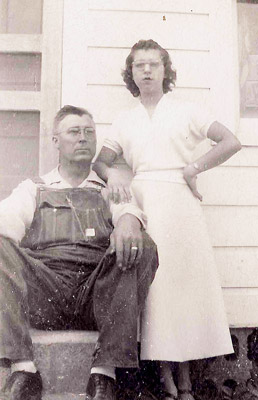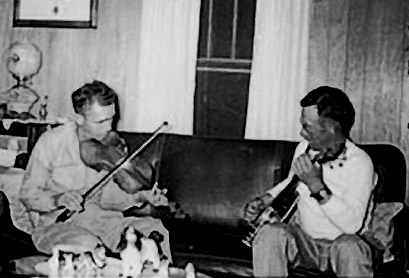by Lucas Pasley
Despite having produced well-known fiddlers such as Guy Brooks, Art Wooten, and Tim Smith, Alleghany County’s rich old-time fiddling tradition has remained largely out of the spotlight. This CD attempts to capture not only the importance of Alleghany’s fiddling heritage, but also its own unique character. As with other mountain musical communities, the common threads of tradition met the innovative touch of the musicians to create a complex and powerful sound.
There was, however, a tremendous flow of exchange between Alleghany and bordering counties. According to Brad Leftwich, Tommy Jarrell learned his unique version of John Henry from Alleghany County, and prominent Alleghany fiddlers such as Huston Caudill traveled to Virginia for work and played with Grayson County fiddlers such as Luther Davis. State and county lines meant little to the flow of music and musicians, and Alleghany’s musical heritage is richly interwoven with the surrounding areas.
The recordings of Lawn Brooks, Mack Brooks, and some of the Howard Joines and Cleave Andrews cuts came from a musical gold mine that was brought to me in 2011. Cliff Evans was a well-known jeweler and guitar player in the area, and many old-time, country, bluegrass, and gospel musicians stopped by to play and be recorded on Cliff’s reel-to-reel player. Cliff recorded everything. He captured birds singing, friendships, parties, and an incredible musical heritage from the 50’s through the 70’s. The other tracks are a combination of field recordings gathered by me and Kilby Spencer, who has helped immeasurably with bringing this CD to fruition.
Overall, these five fiddlers offer a slice of the rich music of Alleghany County. As in other places, some of the fiddlers remained firmly rooted in their fiddling heritage while others purposefully and powerfully put their own innovation into the music.
The Fiddlers
Lawnie H. Brooks (1893-1964) was the older brother of Guy Brooks, fiddler for the Red Fox Chasers. Although he never made any commercial recordings, Lawn played fiddle his whole life, and Cliff Evans was one of his dearest friends. The two got together regularly to spend an evening playing and recording music. Lawn played on a Russian fiddle that he received in exchange for work with the Duncan family. It has a delicate sound that suits his fiddling well. The family describes Uncle Guy as more of a square dance fiddler and Uncle Lawn as more refined. One of his daughters described to me her fond memories of quietly sitting in the living room of their farmhouse after dark and listening to her father fiddle in the evening. Lawn was also a well-known craftsman: wagoner, blacksmith, and gunsmith. Lawn dreamed of rising to greater heights with his music, but felt held back by an gunshot wound to his right arm that he felt caused him to lose his edge with the bow. I believe he would be proud to know that people were listening to his music and learning his tunes on this CD.
Mack Brooks (1902-1966) was from a different set of Brookses than Guy and Lawn and was widely known as T-Model Mack. Guy and Lawn did have a brother named Mack who played a little in his youth, but he was widely-known as a preacher. Fiddling Mack frequently played at the VFW square dance in Sparta, and as the recording indicates, his fiddling was powerful and perfect to move the dancers. He ran a convenience store and gas station off the Blue Ridge Parkway on Shawtown Road. His tremendous sense of humor was legend: one day a traveler from out of town stopped at the store and Mack noticed his Pennsylvania license plates. When the traveler stepped out and asked rudely where all the hillbillies were, Mack quickly responded, “Up in Pennsylvania teaching school.” In addition to music, Mack also loved to bowl and was proud to receive a trophy for being the oldest bowler at Sparta’s first bowling alley. In general, he lived life with a powerful joy that came out in everything he did.
Kilby Reeves (1898-1980) is a member of the musical Reeves family, and the grandfather of renowned bluegrass fiddler Tim Smith. Kilby was a hardworking farmer in the days before tractors and always worked for himself on his farm close to Twin Oaks. In the evenings after work, when Kilby wasn’t getting ready for a fox hunt, Art Wooten (Bill Monroe’s first fiddler) would come up to Kilby’s for help learning to play. Kilby mostly played for local square dances at people’s houses but did compete and win at the Galax Fiddlers Convention. The family recounts a humorous story of a day when Kilby stepped outside in nothing but his overalls, literally, and stepped onto a yellow jackets’ nest. He didn’t hesitate to jump out of those overalls and ended up standing in the yard buck naked. Luckily, his wife was the only one to witness the spectacle.
Cleave Andrews (1895-1969) would certainly have grown up with the fiddle music of the area, but, according to his nephew, first learned to play the fiddle in a WWI prison camp in Africa when fellow inmate BILL BILL showed him some of the basics. To make a living after the war, he worked in the Dr. Grabow pipe factory and delivered milk while keeping up his fiddling playing regularly at the VFW square dance in Sparta and other local venues. He played with well-known banjo player Junior Maxwell in the Little River Boys, and while they would have called themselves a bluegrass band, Cleave’s old-time fiddling heritage comes through every note.
Howard Joines (1908-1981) was a virtuoso fiddler. Starting on a toy fiddle at 7 years old, it wasn’t long before the neighbors were coming by to hear him play. He left Alleghany when he was 18 to join Red Gay’s Brown Jug Fiddling Band but returned to work on the Parkway and raise beef cattle. He greatly admired the fiddling of Red Gay, Clayton McMichen of the Skillet Lickers, and Kenny Baker. He was a regular fiddler at the VFW square dance and would play with many others – Cliff Evans, Ed Atwood, Paul Joines, and Junior Maxwell to name a few. Howard was part of a generation of fiddlers that were both old-time and bluegrass, both deeply rooted in tradition and yet progressive and innovative in their fiddling and musicianship. Howard’s repertoire ranges from timeless tunes like “Soldier’s Joy”, to contemporary jazz and pop like “Get Out and Get Under The Moon”, to bluegrass classics like “Pig in the Pen.”
For further reading, see Howard Joines article by TJ Worthington in the Old-Time Herald, April 2014. Learned from Red Gay, Clayton McMitcheon,
Information from Strings of Life by Kevin Donleavy and interviews with Richard Joines (Howard Joines), Maxine Fender (Mack Brooks), Lawn Brooks’s children, Ray and Tim Smith (Kilby Reeves), Tom Edwards (Cleave Andrews) and TJ Worthington.



